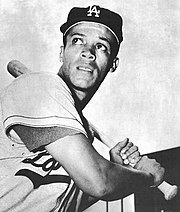1965 World Series
The Dodgers' strong core of pitchers, which also included Claude Osteen and Ron Perranoski, kept them in the pennant race and into the Series.
Koufax, surviving on a steady diet of Cortisone and pain killers for his arthritic left elbow,[1] pitched five times in 15 days down the stretch, winning four (three shutouts), including 13 strikeouts in the pennant winner against Milwaukee.
[2] Dodger hitting however remained strictly popgun, especially after Tommy Davis went down in late April for the season with a broken ankle.
[3] Manager Walter Alston promptly called up 12-year minor league veteran Lou Johnson from Spokane.
The Twins, managed by Sam Mele, had a more balanced attack, equally strong in pitching and hitting, although their defense committed 173 errors including 39 by shortstop Zoilo Versalles.
Offensively Mele again had balance with good hitting, power and speed up and down his lineup that included the AL's leading hitter (Tony Oliva, at .321), and 20-plus home runs from five different players, including top-level slugger Harmon Killebrew, normally good for 40+ per year, though limited to 25 in 1965 due to missing nearly two months of the season with an injury.
Also, it is the earliest World Series whose telecasts are known to survive in their entirety; the CBC has complete kinescopes of all seven games in its archives.
Drysdale was starting because the game fell on Yom Kippur, the holiest day of the year in the Jewish calendar.
It started with a Frank Quilici double to left field, followed by an error by Jim Lefebvre, allowing the pitcher Grant to reach.
With three straight singles (Earl Battey, Don Mincher, and Quilici), scoring three unearned runs, the Twins had jumped out to a six-run lead and would never look back, winning the game 8–2.
In the top of the fifth, Ron Fairly singled, then left-fielder Bob Allison made a diving, sliding catch of a fly ball off the bat of Jim Lefebvre, preventing a run.
The play cost the Dodgers dearly, Jim Lefebvre bruising his heel crossing the plate with the second of the two runs.
The Dodgers, already short on hitting (Lefebvre was batting .400 at the time), went with Dick Tracewski (.118 for the Series) at second base the rest of the way.
Osteen, who as a pitcher for the Senators had had a perfect 5–0 record against the Twins, completed the game by getting Zimmerman to ground into a double play.
In a rematch of Game 1 pitchers Drysdale and Grant, the Dodgers ace prevailed, allowing only two runs on five hits.
Maury Wills collided at first base with Twins second baseman Frank Quilici on an infield single as pitcher Grant was slow to cover the bag.
In the fourth inning, Battey reached on an error by Dick Tracewski, followed by a Bob Allison two-run home run.
He also helped himself, as had Koufax for L.A. the game before, but in this case with a towering three-run home run, after Quilici was intentionally walked to get to Grant.
A Fairly home run, his second of the series, put the Dodgers on the board to make the score 5–1, but that's all they would get as Grant pitched a complete game.
Twins catcher Earl Battey brought the nearly 50,000 Metropolitan Stadium fans to their feet by leading off the second inning with a triple past a diving Willie Davis in center.
Battey showed no outward ill-effects of his collision with the railing in Game 3, diving headfirst into third base on the play.
Battey continued his fine play in the fourth by hustling to first when Tracewski booted his groundball, and Allison followed with a home run.
Koufax had trouble throwing his curveball for strikes but escaped a couple of early jams, including two walks in the first inning and an unusual incident in the third inning when Zoilo Versalles appeared to have stolen second base with one out, but was ordered back to first after batter Joe Nossek was ruled out for interference.
Koufax effectively gave up on his curveball and pitched the late innings almost exclusively with fastballs, still baffling the hard-hitting Twins.
But third baseman Jim Gilliam (who was often replaced late in games for defensive reasons) made a diving, backhanded stop and stepped on third for a force.
He ended up tossing a three-hit shutout, striking out ten in one of the greatest Game 7 pitching performances ever.
Through 2024, the Twins have never won a road World Series Game (not including when the franchise was the original Washington Senators).
Despite being at the peak of his career, Sandy Koufax retired after the series at age 30, due to chronic arthritis and bursitis in his pitching elbow.
Meanwhile, the Twins would have to wait 22 more years before returning to the World Series in 1987, where they would finally win their first championship since 1924 (known then as the Washington Senators), and their first since moving to Minnesota, by beating the St. Louis Cardinals in seven games.
Hurley was the home plate umpire when St. Louis Browns owner Bill Veeck sent 3-foot-7 midget Eddie Gaedel to bat in a 1951 game vs. the Detroit Tigers.






